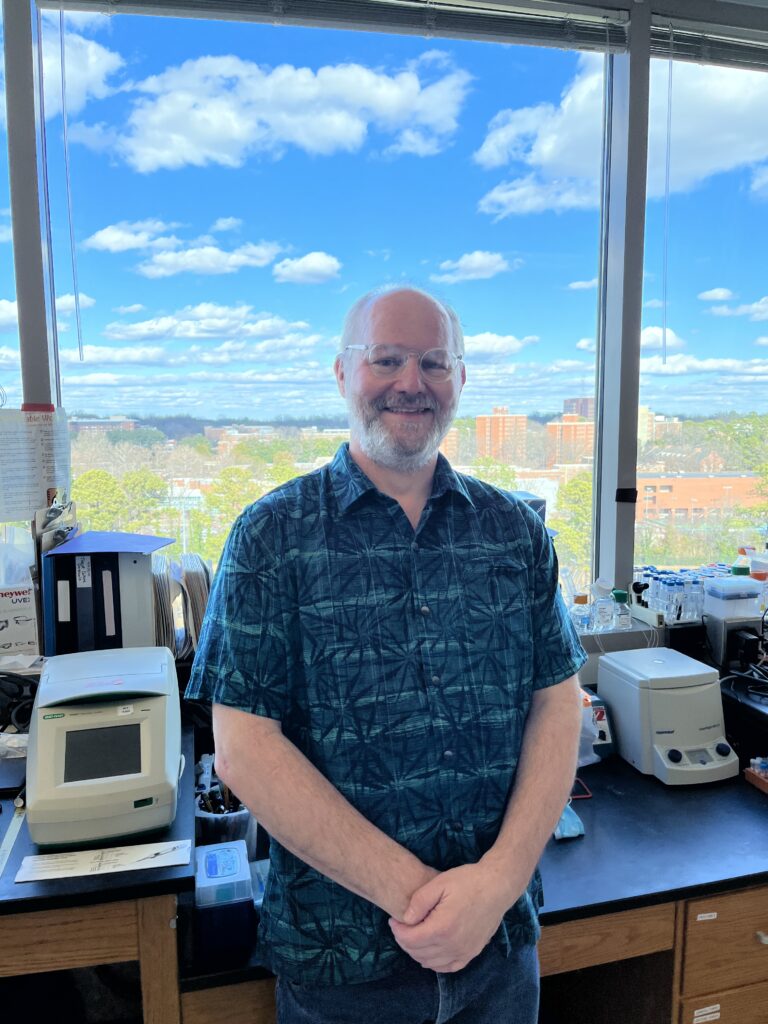Meet Robert!
The Biotechnology Program’s new lab manager, Robert Thomas, joined the staff last semester. Since the position was empty for a few months, his presence was greatly welcomed on the sixth floor of Jordan Hall.

Robert got his start in biology when he earned his Bachelor of Arts in Biology from Sangamon State University (now part of the University of Illinois). From there, he journeyed to NC State to earn his master’s in botany, specializing in embryogenesis and studying the loblolly pine tree. He then went straight to industry work, where he stayed for some years before coming back to NC State as a research technician/associate in 2016. After deciding he wanted a change of pace, he applied to and joined the BIT program in the fall of 2022.
When asked what made him decide to switch to an educational setting after so long in research and development, Robert explained that “In research, you often work grant to grant, project to project. Once the project is complete, you could be out of a job until there is a new grant.” He also talked about how BIT was different than most academic lab settings because they are teaching-oriented. “In some ways, it’s more calm [than industry]. It’s not as worrisome. There’s a routine,” he said about the transition.
Although he started as the lab manager in the middle of the semester, Robert mentioned how he was able to “keep his head above water” not only because of his background in biology but also because he had taken and was a teaching assistant for BIT 410 Manipulation of Recombinant DNA in 1993 when the BIT Program was just being created. Even though most technical aspects of the class have changed (I’m thankful it’s no longer a summer course with 40 hours of class each week!), many of the key biotechnology concepts have stayed the same over the years. He explained how this class was particularly hard for him, saying, “I did plant tissue culture for my master’s degree, so what I worked with was something you could see. You could see it in a flask, you can put it under a dissecting microscope and manipulate it. A lot of what we do [in BIT 410], is in a test tube and you look at it in a gel or using a spectrophotometer.”
After being a bench scientist for so long, Robert is finding a lot of appreciation for his new role. Being a lab manager means keeping up with inventory and equipment, but it also means that he gets to help facilitate the learning environment. By making sure everything is where it needs to be and functioning as it should, he is ensuring all labs run smoothly. Additionally, he gets to use his tissue culture knowledge during some of the BIT 410/510 labs, assisting students in the biosafety cabinet room and at the bench. Madison, BIT’s postbac, helped train Robert, but this summer a new postbac will be hired and he will get to mentor them! “We try to have a give and take here, it’s not just come up here and work for us. We try to give people valuable skills that they can take with them to wherever it is they go,” he said about mentorships in the BIT Program.
“We try to have a give and take here, it’s not just come up here and work for us. We try to give people valuable skills that they can take with them to wherever it is they go.”
-Mr. Robert Thomas
Many of the BIT faculty and staff have a side project they lead; whether this is their lab module class, conducting research, or updating the curriculum. Robert’s project falls in line with his passion for safety. In my experience, BIT classes already have some of the best safety measures I’ve seen at NC State. However, Robert knows some of the larger industry companies push safety extra hard, and he wants to ensure students going through BIT classes are prepared for that.
Safety management also includes waste management. If you have ever taken a BIT lab, you know most things are already prepared for one-time use. As nice as this is for students, it creates a lot of waste, some of which belongs in the normal trash and some in the biohazard bins. “Our streams of unwanted material that occur from these different labs, we’re trying to make sure we have the streams correct and that things are flowing out to where they’re supposed to,” he said.
After learning so much (including all of Google Suite) in his first few months, Robert hopes that this is the position he will retire from, mentioning how this job is something he could enjoy doing for a while. He had many things to list when asked what his favorite part was, including every staff member, the “mix of familiarity and newness” within his position, and, of course, the view!
- Categories: